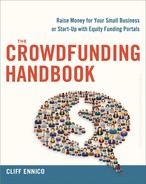SUGGESTIONS FOR FURTHER READING
As this book is going into print, the SEC has just approved the Title III crowdfunding regulations. Accordingly, there are not many how-to resources for issuers looking to take advantage of the new financing options created by the federal Jumpstart Our Business Startups (JOBS) Act of 2012.
Primary Source Materials
On April 5, 2012, President Barack Obama signed into law the U.S. Jumpstart Our Business Startups (JOBS) Act of 2012, Pub.L. 112-206, 126 Stat. 306, codified at 15 U.S.C. § 78a note, which can be found at www.gpo.gov/fdsys/pkg/PLAW-112publ106/pdf/PLAW-112publ106.pdf.
On July 10, 2013, the U.S. Securities and Exchange Commission (SEC) issued regulations implementing Title II of the JOBS Act in its Release No. 33-9416, which can be found at www.sec.gov/rules/proposed/2013/33-9416.pdf.
The SEC submitted its first draft of Regulation Crowdfunding—containing regulations implementing Title III of the JOBS Act of 2012—for public approval on October 23, 2013, in its Release No. 33-9470, which can be found at www.sec.gov/rules/proposed/2013/33-9470.pdf.
Comments on Regulation Crowdfunding submitted during the two-year period between proposal and adoption were collected by the SEC at www.sec.gov/comments/jobs-title-ii/jobs-title-iii.shtml.
The final version of the Title III crowdfunding regulations were issued by the SEC in its Release No. 33-9974, dated October 30, 2015, which can be found at www.sec.gov/rules/final/2015/33-9974.pdf. The regulations became effective on May 16, 2016, six months after publication in the Federal Register.
Funding Portals
Beginning January 26, 2016, after this book went to press, the SEC began allowing funding portals to register under Title III and Regulation Crowdfunding. Among the companies expected to register with the SEC as of December 15 are:
Angel.co (the website of Angel List LLC, a social media company dedicated to identifying angel investor communities and creating angel investor syndicates for Title II accredited-investor only offerings).
EquityNet.com (billed as the “original equity crowdfunding platform,” EquityNet boasts a patented software system that streamlines the business-planning process).
GrowVC.com (with offices in New York, London and Hong Kong, is positioning itself to be a player in international crowdfunded offerings).
SeedInvest.com (a technology platform that enables equity-based accredited investor crowdfunding).
Start.ac (changed the playing field for crowdfunding by letting members, who are potential investors, rank, rate, and suggest ways to improve a start-up idea).
IPOVillage.com (helped launch Crowdfunding-Website-Reviews.com, one of the Internet’s top sites for getting information on crowdfunding platform websites).
Microventure.com (an angel investor Title II crowdfunding portal specializing in technology companies).
TruCrowd.com (focuses on serving nonaccredited investors).
Sprigster.com (focuses on providing crowdfunded financing for franchised businesses).
Start-upValley.com (focuses on start-ups and very early-stage companies).
SyndicateRoom.com (the United Kingdom’s first equity crowdfunding platform that focuses on the investors and investor returns; requires that issuing companies must first have a lead business angle, or group of lead investors, on board providing a minimum of 25 percent of the funding round out of pocket).
Other Websites
Crowdfund Capital Advisors, CCA (www.crowdfundcapitaladvisors.com, a think tank for equity crowdfunding, run by the three entreprenerus who lobbied Congres to pass the JOBS Act).
The Crowdfunding Professional Association (www.crowdfundingprofessional.org).
The Crowdfunding Accreditation for Platform Standards Program (www.crowdsourcing.org/caps).
The Crowdfund Intermediary Regulatory Advocates (ww.cfira.org).
The National Crowdfunding Association (www.nlcfa.org).
Crowdfunding Abstracts (www.cfabstracts.com, up-to-the-minute news about crowdfunded investing).
Books
The Crowdfunding Revolution: How to Raise Venture Capital Using Social Media, by Kevin Lawton and Dan Marom (New York: McGraw-Hill, 2012), $26.99.
Crowdfund Investing for Dummies, by Sherwood Neiss, Jason W. Best, and Zak Cassady-Dorion (New York: John Wiley & Sons, 2013), $26.99. The first book on this subject, written by the three entrepreneurs who successfully lobbied Congress to pass the JOBS Act but published before the SEC issued its Title II and Title III crowdfunding regulations.
Crowdfund Your Start-Up: Raising Venture Capital Using New Crowdfunding Techniques, by Rupert M. Hart (Houston: CordaNobelo, 2012), $9.95.
The JOBS Act: Crowdfunding for Small Businesses and Start-Ups, by William Michael Cunningham (New York: Apress, 2012), $14.99.
Resources for Writing a Business Plan
Books (with or without CD-ROMs)
Financial Intelligence for Entrepreneurs, by Karen Berman (Cambridge: Harvard Business Review, 2008), $29.95.
How to Write a Business Plan, by Mike McKeever (San Francisco: Nolo Press, 2014), $21.95.
How to Write a Winning Business Plan, by Joseph Mancuso (New York: Touchstone, 1992), $33.95.
The Complete Book of Business Plans, by Joseph Covello and Brian Hazelgren (Naperville: Small Business Sourcebooks, 2006), $19.95.
Writing a Convincing Business Plan, by Arthur DeThomas (Hauppage: Barron’s, 2015), $12.95.
Software Programs
BizPlanBuilder (www.jian.com/business_plan_software/business_plan_solutions.html).
Business Plan Pro (www.businessplanpro.com/template_offer_lt/).
BizPlan.com (www.bizplan.com).
Others (http://business-plan-software-review.toptenreviews.com).
Business Plan Templates
www.bplans.com/samples/sba.cfm.
www.businessplanarchive.org (currently not available to the public).
